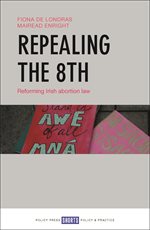View from a Vanguard – Dr Sydney Calkin
- Dates
- Tuesday 27 February 2018 (09:00-16:30)

The Irish government is set to hold a referendum on the 8th Amendment of the Irish Constitution in May 2018. The 8th Amendment effectively bans abortion in Ireland, making Ireland among the most abortion-restrictive states in Europe. If the 8th Amendment is repealed this year, it will mark the first step towards the liberalization of Irish abortion law; although, as campaigner Ailbhe Smyth reminded us in Dublin, the campaign and repeal of the 8th will be only “one point in a continuum”. What will the future of abortion access look like in Ireland after the 8th amendment? Even with constitutional change, other restrictive legislation would remain in place and medical practice around abortion care would take time to establish under a new legal framework. Abortion is a highly controversial political issue across the world, and in many places, there is a substantial gulf between the law and access in practice. This gap implicates the legal framework, medical practices, activist actions on both sides of the issue, and existing socio-economic inequalities.
This was the focus of a one-day workshop co-hosted by Birmingham Institute for Advanced Studies and Trinity College Dublin’s Arts and Humanities Research Institute called “Spatiality and Abortion”. The workshop brought together a group of academics, activists, and politicians who are involved with reproductive rights activism in Ireland and beyond. The workshop focused on abortion travel in the Irish context, with a view to what might happen to abortion access in Ireland if the 8th amendment were repealed in the coming months.

The workshop was co-organized by Fiona de Londras, Professor of Global Legal Studies at Birmingham Law School, and Sydney Calkin, a Leverhulme Postdoctoral Fellow in Geography at Durham University and a Vanguard Fellow at the Birmingham IAS. The workshop was planned as a component of Dr Calkin’s Vanguard Fellowship at Birmingham, with a view to bringing together legal and geographical approaches to the issue of abortion access. The workshop’s focus on spatiality and abortion sought to capture the geographical and socio-economic dimensions of abortion access, pointing to the numerous and intersecting obstacles that can restrict women’s access to abortion, regardless of its legal status.
At the workshop, academics, activists and politicians shared their perspectives about the most important legal and practical challenges to abortion access in Ireland. Politicians, including Senators Lynn Ruane and Ivana Bacik, focused on the legislature’s role in formulating a question for the referendum and framing the public debate. Campaigners, including Ailbhe Smyth and Cara Sanquest, stressed the need to mobilize pro-choice activists in Ireland and in the Irish diaspora abroad to create a broad base of support for the repeal campaign. The keynote speaker, Professor Katherine Side, introduced innovative proposals for telemedicine abortion access in Ireland and discussed the case for abortion care led by women and their decisions. Legal scholars considered the implications of constitutional change and the kind of post-repeal measures that could be introduced to secure a permissive and accessible system of reproductive freedom. Geography scholars pointed out the role of travel and extra-legal obstacles that hinder women’s access to abortion, and create gulfs between the law and everyday experience. The diverse groups represented at the workshop shared a cautious optimism about the 8th referendum, but agreed on the need to think carefully about the shape of post-repeal abortion law and the importance of prioritizing abortion access that puts women in control of their reproductive decisions.

More information on the 8th amendment and the campaign to repeal it can be found in Fiona de Londras and Mairead Enright’s new book, Repealing the 8th, recently published with Policy Press.